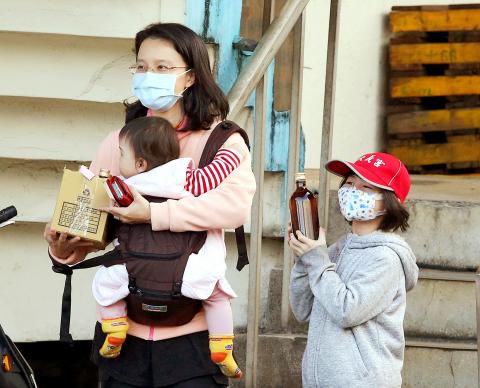The Executive Yuan has instructed state-run Taiwan Tobacco and Liquor Corp (TTL) and Taiwan Sugar Corp (Taisugar) to increase their production lines for 75 percent alcohol, hoping to fix a lack of stock by this week amid fears over the 2019 novel coronavirus (2019-nCoV).
The coronavirus has led to a shortage of surgical masks and alcohol-based sanitizers containing at least 75 percent alcohol in Taiwan, with media reports that some people have been stealing from hospitals after failing to purchase sanitizers.
TTL management said that its staff have been working around the clock since the end of the Lunar New Year holiday.

Photo: CNA
To meet rising demand, the Executive Yuan has instructed the two state-run manufacturers to increase production lines for 75 percent alcohol, on top of their existing production lines for 95 percent alcohol.
For every 10 bottles of 95 percent alcohol produced, 13 to 15 bottles of 75 percent alcohol could be made, which would rid customers of the need to dilute, said a TTL manager who asked to remain anonymous.
Producing more bottles would mean that more people could buy them, the manager added.
A Taisugar manager said that the company only has one production line for 95 percent alcohol.
It would consider outsourcing the production of 75 percent alcohol and is planning later this month to ship 200,000 to 300,000 350ml bottles, the Taisugar manager said.
TTL is to start production of 75 percent alcohol at its factory in Pingtung County, followed by another three to four factories across Taiwan, depending on how the situation develops, said a second TTL manager, who also asked to remain anonymous.
To ensure availability, TTL would produce 330ml, 110ml and 60ml bottles of 75 percent alcohol, with the first batch expected to be delivered by its Pingtung factory today, the second TTL manager said, adding that production capacity is 2,000 to 3,000 dozen bottles per day.
Taisugar and TTL promised to sell 75 percent alcohol at an affordable price, adding that factories would not cease production, so there would be no need to stock up on the product.
More than 8 million additional bottles of alcohol-based sanitizers are expected to enter the market this week, the state-run manufacturers said.
Separately, Minister of Economic Affairs Shen Jong-chin (沈榮津) on Thursday said that the nation was producing 3.2 million surgical masks per day, but hopes to boost the figure to 3.9 million this week and 4.6 million next week.
The Executive Yuan on Jan. 31 also approved a plan to build 60 production lines to make an additional 6 million masks per day to meet demand.
Adding the projected capacity of 4.6 million masks per day, that would eventually bring total production to more than 10 million masks per day, hopefully by early next month, Shen said.

Taiwan is stepping up plans to create self-sufficient supply chains for combat drones and increase foreign orders from the US to counter China’s numerical superiority, a defense official said on Saturday. Commenting on condition of anonymity, the official said the nation’s armed forces are in agreement with US Admiral Samuel Paparo’s assessment that Taiwan’s military must be prepared to turn the nation’s waters into a “hellscape” for the Chinese People’s Liberation Army (PLA). Paparo, the commander of the US Indo-Pacific Command, reiterated the concept during a Congressional hearing in Washington on Wednesday. He first coined the term in a security conference last

Prosecutors today declined to say who was questioned regarding alleged forgery on petitions to recall Democratic Progressive Party (DPP) legislators, after Chinese-language media earlier reported that members of the Chinese Nationalist Party (KMT) Youth League were brought in for questioning. The Ministry of Justice Investigation Bureau confirmed that two people had been questioned, but did not disclose any further information about the ongoing investigation. KMT Youth League members Lee Hsiao-liang (李孝亮) and Liu Szu-yin (劉思吟) — who are leading the effort to recall DPP caucus chief executive Rosalia Wu (吳思瑤) and Legislator Wu Pei-yi (吳沛憶) — both posted on Facebook saying: “I

Sung Chien-liang (宋建樑), who led efforts to recall Democratic Progressive Party (DPP) Legislator Lee Kun-cheng (李坤城), was released on bail of NT$80,000 today amid outcry over his decision to wear a Nazi armband to questioning the night before. Sung arrived at the New Taipei District Prosecutors’ Office for questioning in a recall petition forgery case last night wearing a red armband bearing a swastika, carrying a copy of Adolf Hitler’s Mein Kampf and giving a Nazi salute. Sung left the building at 1:15am without the armband and covering the book with his coat. Lee said today that this is a serious

A mountain blaze that broke out yesterday morning in Yangmingshan National Park was put out after five hours, following multi agency efforts involving dozens of fire trucks and helicopter water drops. The fire might have been sparked by an air quality sensor operated by the National Center for High-Performance Computing, one of the national-level laboratories under the National Applied Research Laboratories, Yangmingshan National Park Headquarters said. The Taipei City Fire Department said the fire, which broke out at about 11am yesterday near the mountainous Xiaoyoukeng (小油坑) Recreation Area was extinguished at 4:32pm. It had initially dispatched 72 personnel in four command vehicles, 16